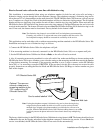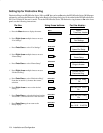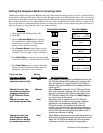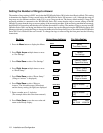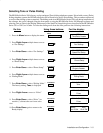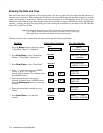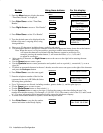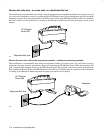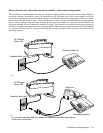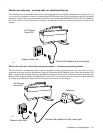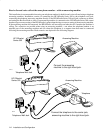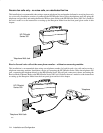2-37
Installation and Configuration
Setting Up for Faxing (U.K. Installation)
The following types of installations are the ones recommended for use with the HP OfficeJet Series 300 to achieve the
best call-handling results. While other situations are possible, it is recommended that one of these be used. Determine
which installation most closely meets the user’s needs and follow the instructions given.
D Receive fax calls only – no voice calls, on a dedicated fax line
D Receive fax and voice calls at the same phone number – without an answering machine
D Receive fax and voice calls at the same phone number – with an answering machine
After selecting the best installation to meet the user needs, the correct reception mode and certain station specific
information will need to be set up. The procedures to accomplish this are in the following topics which are presented
in the HP OfficeJet Series 300 User’s Guide for the user’s model:
D Setting the Reception Mode for incoming calls
D Setting the number of rings to answer
D Selecting Tone or Pulse dialing
D Entering the Date and Time
D Entering the header information (company name and fax number)
The above operations can also be accomplished from the front panel as described earlier in this chapter.
Refer to the HP OfficeJet Series 300 User’s Guide for the user’s model about how to use the Mercury Telephone
Network System.
Using an HP OfficeJet Series 300 with the HP OfficeJet Series 300 Manager and Eclipse FAX SE to control faxing is
briefly described earlier in this section. Detailed information is provided in the HP OfficeJet Series 300 User’s Guide.
Reception mode in an HP OfficeJet Series 300 is set during installation of the software, but can be changed using the
HP OfficeJet Series 300 Manager software by selecting the Receive Mode in the Receive Fax Setup dialog box as
described in the HP OfficeJet Series 300 User’s Guide for the user’s model.
The reception mode can also be changed using the front panel as described earlier in this chapter.



